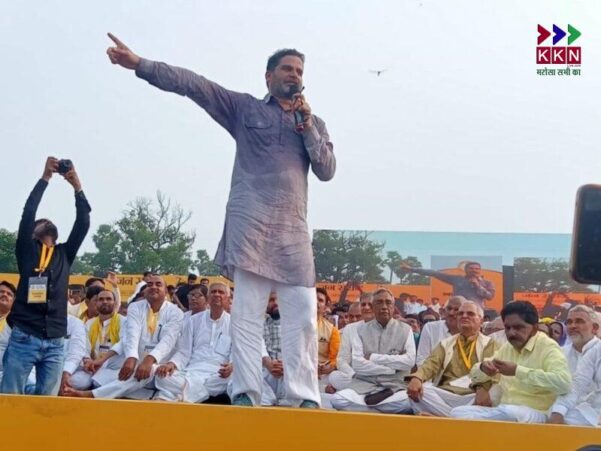
Prashant Kishor, the leader of the Jan Suraaj Party (JSP), has announced a major campaign relaunch. This renewed political effort will commence in Bihar on January 15. In a dramatic move, Prashant Kishor declared a massive personal donation. He pledged to donate all his assets, excluding one Delhi home, to the party. Furthermore, he committed ninety percent of his earnings for the next five years to Jan Suraaj. This announcement signals a complete personal investment in the party’s future.
Jan Suraaj Relaunch: A Commitment After Electoral Defeat
The Jan Suraaj Party faced a severe setback in the recent Bihar Assembly elections. They contested 238 seats but secured zero victories. Following this defeat, Prashant Kishor undertook a twenty-four-hour atonement fast. This fast was held at the Gandhi Ashram in Champaran. Breaking the fast, he announced the party’s new beginning on January 15. The focus is now on mobilizing ground support.
Prashant Kishor stated the Jan Suraaj activists would visit every ward. They will actively monitor the implementation of government promises. This grassroots approach aims to hold the administration accountable. He emphasized the necessity of resources for the party’s continuation. He also stressed the need for financial stability to sustain the long-term political struggle.
The seasoned political strategist has now converted his personal wealth into political capital. He is retaining only one house in Delhi for his family. Every other piece of his movable and immovable property is being donated. This unprecedented act shows his dedication. He is betting his personal fortune on the party’s success. This is a crucial pivot for the Jan Suraaj movement.
Fueling the Movement: A Five-Year Financial Pledge
Prashant Kishor is a highly sought-after political consultant. He announced a significant financial pledge for the coming years. For the next five years, he will donate at least ninety percent of his income. This substantial financial backing will fund Jan Suraaj’s operations. This includes ground mobilization and administrative costs. This strategic move ensures the party’s financial independence. It shields the organization from outside influence.
He also issued a direct appeal to the general public. He requested ordinary citizens to contribute financially to Jan Suraaj. Specifically, he asked people to donate a minimum of one thousand rupees annually. This push for public funding aims to democratize the party’s resources. It seeks to build a movement supported by the people of Bihar.
The party leader also announced a major change in accessibility. From now on, he will only meet with individuals who have donated at least one thousand rupees to Jan Suraaj. This measure reinforces the importance of public contribution. It is a clear step towards prioritizing committed supporters. This new policy marks the beginning of a time of struggle.
Fighting for Women’s Welfare: The Rs 10,000 and Rs 2 Lakh Schemes
Prashant Kishor highlighted key government schemes for women’s welfare. He specifically mentioned the promise of distributing ten thousand rupees to women. Another scheme involves providing two lakh rupees later on. He noted that there were no conditions attached to the initial ten thousand rupee grant. However, he warned that officials might impose conditions for the two lakh rupees.
He pointed out the rules set by the Rural Development Ministry. These rules are for the Chief Minister Women Employment Scheme. Prashant Kishor declared it the duty of Jan Suraaj workers to act. They must ensure that the application forms are filled and submitted. This applies to the approximately one and a half crore eligible women in Bihar.
The party plans to deploy its workers across the state. They will visit one lakh eighteen thousand wards in Bihar. Their mission is to assist women with the complex application process. This effort serves a dual purpose. It aims to ensure that women receive the promised two lakh rupees. If the funds are not disbursed, it will expose government failures. He stated this process would teach people a valuable lesson. It would show them not to sell their votes in the future.
The Vote Selling Controversy: NDA’s Alleged Strategy
Prashant Kishor did not shy away from commenting on the election results. He strongly criticized the ruling National Democratic Alliance (NDA). He accused the NDA of buying votes in Bihar. He dramatically claimed that the votes were bought for just five rupees and fifty paise per day. This statement was made while discussing the reasons for the Jan Suraaj defeat.
This allegation highlights his belief in systemic corruption. It underscores the challenges faced by independent political movements. He suggests that financial inducement heavily influenced the electoral outcome. His decision to donate his personal wealth is a response to this system. It is an effort to compete against the financial muscle of established parties. His focus remains on the integrity of the democratic process.
The Way Forward: A Grassroots Movement Strategy
The renewed campaign starting on January 15 is highly focused. It emphasizes intense grassroots mobilization. Jan Suraaj intends to be a continuous presence in every village. The workers will go beyond traditional campaigning. They will actively engage in governance monitoring. This strategy transforms the party into a citizens’ action group.
Prashant Kishor’s strategic thinking is evident in this plan. He understands the power of connecting with voters personally. The goal is to build long-term loyalty and support. His personal sacrifice is meant to inspire both workers and donors. It sends a powerful message of commitment and sincerity. The party is prioritizing direct impact on citizens’ lives.
The fight is now shifting to the implementation of social schemes. By assisting women, the party builds trust. It also exposes bureaucratic hurdles and official inaction. This approach weaponizes government failure for political gain. It positions Jan Suraaj as the true advocate for the common people. The long-term objective is to achieve political relevance in the upcoming elections.


